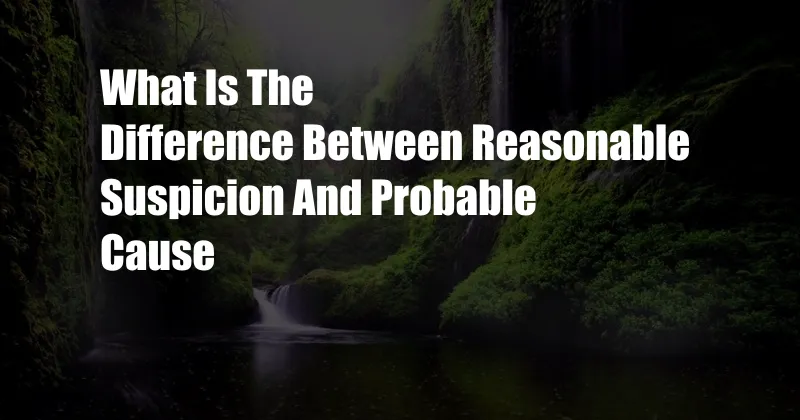
Reasonable Suspicion vs. Probable Cause: Decoding Fourth Amendment Safeguards
In the realm of law enforcement, the distinction between reasonable suspicion and probable cause holds immense significance, shaping the scope of police powers. This article delves into the nuances of these two legal thresholds, their implications for police actions, and the constitutional protections they safeguard.
Reasonable Suspicion: A Substantiated Basis for Limited Intrusion
Reasonable suspicion, as defined by the Fourth Amendment of the U.S. Constitution, serves as the legal justification for certain police actions, such as brief detentions or investigative stops. It arises when an officer has specific and articulable facts giving rise to a well-founded belief that a person may be engaged in criminal activity. This standard requires a reasonable person to believe that the person detained has committed, is committing, or is about to commit a crime.
The Supreme Court has established that reasonable suspicion must be based on more than mere hunch or speculation. It requires specific observations, behaviors, or circumstances that lead the officer to suspect the individual’s involvement in criminal activity. These may include furtive gestures, evasive movements, or flight from the police.
Probable Cause: A Robust Standard for Arrests and Searches
Probable cause, a stringent legal standard, serves as the bedrock for arrests, searches, and seizures under the Fourth Amendment. It requires that the totality of circumstances would lead a reasonable person to believe that an individual has committed or is about to commit a crime. This standard demands a strong likelihood of criminal activity based on specific facts and circumstances.
Unlike reasonable suspicion, probable cause cannot be based solely on the officer’s subjective belief. It requires objective evidence or information that supports the officer’s determination. This evidence may include eyewitness accounts, statements from informants, a victim’s testimony, or physical evidence linking the individual to the crime.
Key Differences: Comparing Reasonable Suspicion and Probable Cause
Table 1 outlines the key differences between reasonable suspicion and probable cause:
| Feature | Reasonable Suspicion | Probable Cause |
|---|---|---|
| Threshold | Brief detentions, investigative stops | Arrests, searches, seizures |
| Standard | Well-founded belief of criminal activity | Strong likelihood of criminal activity |
| Basis | Articulable facts and specific observations | Objective evidence or strong information |
| Sufficiency | Reasonable person standard | Reasonable person standard based on totality of circumstances |
Balancing Interests: Striking an Equilibrium
The distinctions between reasonable suspicion and probable cause reflect the delicate balance between individual rights and the government’s need to investigate and prevent crime. Reasonable suspicion provides police with limited authority to temporarily detain individuals based on reasonable grounds, while probable cause ensures that more invasive actions, such as arrests and searches, are supported by substantial evidence. This balance ensures that law enforcement can effectively perform their duties without infringing on citizens’ constitutional liberties.
Expert Advice: Navigating the Legal Labyrinth
Attorney Benjamin Carter, an experienced criminal defense lawyer, offers valuable advice for individuals encountering police interactions:
- When approached by a police officer, remain calm and cooperative.
- Provide basic information, such as your name and address, but do not consent to searches or arrests without consulting an attorney.
- If detained for a brief period, ask the officer the reason for the detention.
- Do not resist arrest, even if you believe the officer lacks probable cause. Your rights can be asserted later in court.
- Immediately request legal assistance to protect your rights and determine the legal basis for your detention or arrest.
FAQs: Demystifying Reasonable Suspicion and Probable Cause
Q: How do officers determine reasonable suspicion?
A: Officers consider various factors, including the individual’s behavior, suspicious circumstances, and information from witnesses or informants.
Q: Can police arrest someone based on reasonable suspicion?
A: No, reasonable suspicion alone is insufficient for an arrest. Probable cause is required for arrests.
Q: What is the difference between a traffic stop and an investigative stop?
A: A traffic stop is based on a violation of traffic laws, while an investigative stop is based on reasonable suspicion of criminal activity.
Q: What happens if an arrest is made without probable cause?
A: An arrest made without probable cause is considered unconstitutional and may lead to the suppression of evidence or the dismissal of charges.
Conclusion: Safeguarding Rights, Upholding Justice
Understanding the distinction between reasonable suspicion and probable cause is paramount for both citizens and law enforcement officers. By adhering to these legal thresholds, we safeguard individual liberties, protect against arbitrary intrusions, and ensure the fair administration of justice.
Are you interested in learning more about the topic of Reasonable Suspicion and Probable Cause? If so, let us know in the comments below.